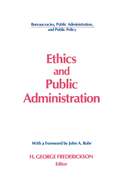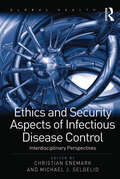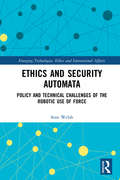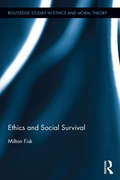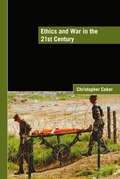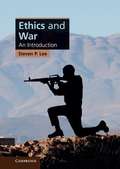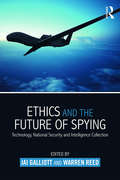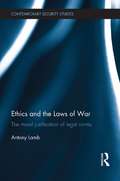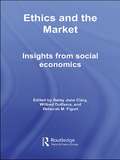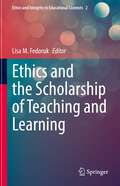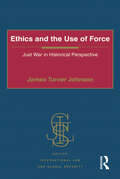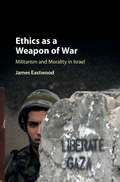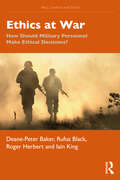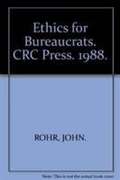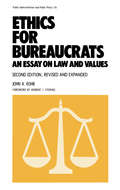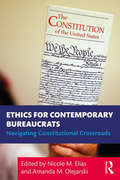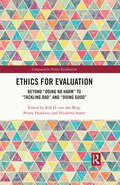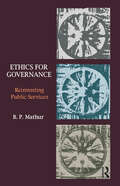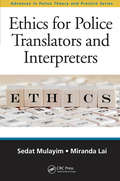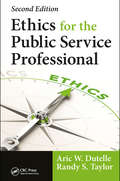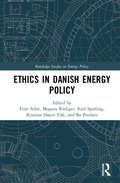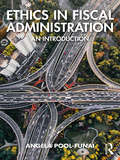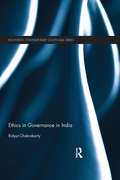- Table View
- List View
Ethics and Public Administration (Bureaucracies, Public Administration, And Public Policy Ser.)
by John A. Rohr H George Frederickson"Ethics and Public Administration" refutes the arguments that administrative ethics cannot be studied in an empirical manner and that empirical analysis can deal only with the trivial issues in administrative ethics. Within a theoretical perspective,the authors qualify their findings and take care not to over-generalise results. The findings are relevant to the practice of public administration. Specific areas addressed include understanding public corruption, ethics as control, and ethics as administration and policy
Ethics and Public Policy: A Philosophical Inquiry
by Jonathan WolffEthics and Public Policy: A Philosophical Inquiry is the first book to subject important and controversial areas of public policy to philosophical scrutiny. Jonathan Wolff, a renowned philosopher and veteran of many public committees, such as the Gambling Review Body, introduces and assesses core problems and controversies in public policy from a philosophical standpoint. Each chapter is centred on an important area of public policy where there is considerable moral and political disagreement.
Ethics and Security Aspects of Infectious Disease Control: Interdisciplinary Perspectives (Global Health)
by Michael J. SelgelidThe increasing emergence, re-emergence, and spread of deadly infectious diseases which pose health, economic, security and ethical challenges for states and people around the world, has given rise to an important global debate. The actual or potential burden of infectious diseases is sometimes so great that governments treat them as threats to national security. However, such treatment potentially increases the risk that emergency disease-control measures will be ineffective, counterproductive and/or unjust. Research on ethical issues associated with infectious disease is a relatively new and rapidly growing area of academic inquiry, as is research on infectious diseases within the field of security studies. This volume incorporates ethical and security perspectives, thus furthering research in both fields. Its unique focus on the intersection of ethical and security dimensions will, furthermore, generate fresh insights on how governments should respond to infectious disease challenges. Readers should include professionals and scholars working in infectious disease, epidemiology, public health, health law, health economics, public policy, bioethics, medical humanities, health and human rights, social/political philosophy, security studies, and international politics.
Ethics and Security Automata: Policy and Technical Challenges of the Robotic Use of Force (Emerging Technologies, Ethics and International Affairs)
by Sean WelshCan security automata (robots and AIs) make moral decisions to apply force on humans correctly? If they can make such decisions, ought they be used to do so? Will security automata increase or decrease aggregate risk to humans? What regulation is appropriate? Addressing these important issues this book examines the political and technical challenges of the robotic use of force. The book presents accessible practical examples of the ‘machine ethics’ technology likely to be installed in military and police robots and also in civilian robots with everyday security functions such as childcare. By examining how machines can pass ‘reasonable person’ tests to demonstrate measurable levels of moral competence and display the ability to determine the ‘spirit’ as well as the ‘letter of the law’, the author builds upon existing research to define conditions under which robotic force can and ought to be used to enhance human security. The scope of the book is thus far broader than ‘shoot to kill’ decisions by autonomous weapons, and should attract readers from the fields of ethics, politics, and legal, military and international affairs. Researchers in artificial intelligence and robotics will also find it useful.
Ethics and Social Survival (Routledge Studies in Ethics and Moral Theory)
by Milton FiskWhen speaking of society’s role in ethics, one tends to think of society as regimenting people through its customs. Ethics and Social Survival rejects theories that treat ethics as having justification within itself and contends that ethics can have a grip on humans only if it serves their deep-seated need to live together. It takes a social-survival view of ethical life and its norms by arguing that ethics looks to society not for regimentation by customs, but rather for the viability of society. Fisk traces this theme through the work of various philosophers and builds a consideration of social divisions to show how rationalists fail to realize their aim of justifying ethical norms across divisions. The book also explores the relation of power and authority to ethics—without simply dismissing them as impediments—and explains how personal values such as honesty, modesty, and self-esteem still retain ethical importance. Finally, it shows that basing ethics on avoiding social collapse helps support familiar norms of liberty, justice, and democracy, and strives to connect global and local ethics.
Ethics and War in the 21st Century (Lse International Studies Ser.)
by Christopher CokerThis book explores the ethical implications of war in the contemporary world. The author, a leading theorist of warfare, explains why it is of crucial importance that Western countries should continue to apply traditional ethical rules and practices in war, even when engaging with international terrorist groups.The book uses the work of the late Am
Ethics and War: An Introduction
by Steven P. LeeWhat are the ethical principles underpinning the idea of a just war and how should they be adapted to changing social and military circumstances? Steven P. Lee presents the basic principles of just war theory, showing how they evolved historically and how they are applied today in global relations. He examines the role of state sovereignty and individual human rights in the moral foundations of just war theory and discusses a wide range of topics including humanitarian intervention, preventive war, the moral status of civilians and enemy combatants, civil war and terrorism. He shows how just war theory relates to both pacifism and realism. Finally, he considers the future of war and the prospects for its obsolescence. His clear and wide-ranging discussion, richly illustrated with examples, will be invaluable for students and other readers interested in the ethical challenges posed by the changing nature of war.
Ethics and the Future of Spying: Technology, National Security and Intelligence Collection (Studies in Intelligence)
by Jai Galliott Warren ReedThis volume examines the ethical issues generated by recent developments in intelligence collection and offers a comprehensive analysis of the key legal, moral and social questions thereby raised. Intelligence officers, whether gatherers, analysts or some combination thereof, are operating in a sea of social, political, scientific and technological change. This book examines the new challenges faced by the intelligence community as a result of these changes. It looks not only at how governments employ spies as a tool of state and how the ultimate outcomes are judged by their societies, but also at the mind-set of the spy. In so doing, this volume casts a rare light on an often ignored dimension of spying: the essential role of truth and how it is defined in an intelligence context. This book offers some insights into the workings of the intelligence community and aims to provide the first comprehensive and unifying analysis of the relevant moral, legal and social questions, with a view toward developing policy that may influence real-world decision making. The contributors analyse the ethics of spying across a broad canvas – historical, philosophical, moral and cultural – with chapters covering interrogation and torture, intelligence’s relation to war, remote killing, cyber surveillance, responsibility and governance. In the wake of the phenomena of WikiLeaks and the Edward Snowden revelations, the intelligence community has entered an unprecedented period of broad public scrutiny and scepticism, making this volume a timely contribution. This book will be of much interest to students of ethics, intelligence studies, security studies, foreign policy and IR in general.
Ethics and the Laws of War: The Moral Justification of Legal Norms (Contemporary Security Studies)
by Antony LambThis book is an examination of the permissions, prohibitions and obligations found in just war theory, and the moral grounds for laws concerning war. Pronouncing an action or course of actions to be prohibited, permitted or obligatory by just war theory does not thereby establish the moral grounds of that prohibition, permission or obligation; nor does such a pronouncement have sufficient persuasive force to govern actions in the public arena. So what are the moral grounds of laws concerning war, and what ought these laws to be? Adopting the distinction between jus ad bellum and jus in bello, the author argues that rules governing conduct in war can be morally grounded in a form of rule-consequentialism of negative duties. Looking towards the public rules, the book argues for a new interpretation of existing laws, and in some cases the implementation of completely new laws. These include recognising rights of encompassing groups to necessary self-defence; recognising a duty to rescue; and considering all persons neither in uniform nor bearing arms as civilians and therefore fully immune from attack, thus ruling out ‘targeted’ or ‘named’ killings. This book will be of much interest to students of just war theory, ethics of war, international law, peace and conflict studies, and Security Studies/IR in general.
Ethics and the Market: Insights from Social Economics (Routledge Advances in Social Economics)
by Wilfred Dolfsma Deborah M. Figart Betsy Jane ClaryComprising cutting-edge work on the state of social economics today, this theoretically diverse book includes strong emphasis on the role of ethics, morality, identity, and society in economic theorizing. Much existing economic theory overlooks ethics. Rather than situating the market and values at separate extremes of a continuum, Ethics and the Market contends that the two are necessarily and intimately related. This volume brings together some of the best work in the social economics tradition, with strong contributions and pedagogy, and a cross-national blend of economics, philosophy, and policy. The contributors embed the economic within the social, rather than viewing 'the economy' and 'society' as separable spheres of life activity, and in so doing, three key themes are illuminated, corresponding to the volume's tripartite structure: Morality and Markets Redefining the Boundaries of Economics Social Economics in Transition. Ethics and the Market illuminates the diverse and dynamic theoretical approaches that are employed in social economics, reflecting on their continuously evolving relationship with neoclassical economics. Taking an innovative approach, this integrative book challenges traditional ways of thinking, and will prove vital reading for students and academics in the fields of Economics, Sociology, Gender Studies, and Public Policy.
Ethics and the Orator: The Ciceronian Tradition of Political Morality
by Gary A. RemerFor thousands of years, critics have attacked rhetoric and the actual practice of politics as unprincipled, insincere, and manipulative. In Ethics and the Orator, Gary A. Remer disagrees, offering the Ciceronian rhetorical tradition as a rejoinder. He argues that the Ciceronian tradition is based on practical or “rhetorical” politics, rather than on idealistic visions of a politics-that-never-was—a response that is ethically sound, if not altogether morally pure. Remer’s study is distinct from other works on political morality in that it turns to Cicero, not Aristotle, as the progenitor of an ethical rhetorical perspective. Contrary to many, if not most, studies of Cicero since the mid-nineteenth century, which have either attacked him as morally indifferent or have only taken his persuasive ends seriously (setting his moral concerns to the side), Ethics and the Orator demonstrates how Cicero presents his ideal orator as exemplary not only in his ability to persuade, but in his capacity as an ethical person. Remer makes a compelling case that Ciceronian values—balancing the moral and the useful, prudential reasoning, and decorum—are not particular only to the philosopher himself, but are distinctive of a broader Ciceronian rhetorical tradition that runs through the history of Western political thought post-Cicero, including the writings of Quintilian, John of Salisbury, Justus Lipsius, Edmund Burke, the authors of The Federalist, and John Stuart Mill.
Ethics and the Scholarship of Teaching and Learning (Ethics and Integrity in Educational Contexts #2)
by Lisa M. FedorukThis book addresses issues related to ethics and the scholarship of teaching and learning, and pays special attention to ethical concerns and experiences that have arisen from engaging in Scholarship of Teaching and Learning (SoTL) work. The book draws on a range of research projects, theoretical frameworks and narrative experiences to provide multiple perspectives of how meaning is made of research ethics in SoTL, academic community and REB partnerships, experiences of Students as Partners in SoTL, and ethically-minded approaches to teaching, learning and inquiry. Specifically, this edited book includes ethical practices that have become increasingly expansive in an ever-evolving academic environment such as navigating pandemic pedagogy and data ownership due to increased online content. In addition, contributions pertaining to academic community partnerships between REBs and faculty detail realistic narratives and lessons learned about how higher education can become more equitable, diverse and inclusive. Subsequently, decolonial ethics for teaching and learning in higher education, as well as participatory parity, exemplify the need for SoTL practitioners to be responsive to the social and cultural realities of a global context in ways that address social inequities and social responsibility. Relational ethics by way of student perspectives on vulnerability and classroom-based SoTL research underscore the need for students to be taught about their own agency as a means of providing student voice within SoTL work. Lastly, this book celebrates how ethically-minded approaches to teaching, learning and inquiry uncover strategies and pedagogy that encourage concepts such as ethical imagination and systems and design thinking practices.
Ethics and the Use of Force: Just War in Historical Perspective (Justice, International Law and Global Security)
by James Turner JohnsonHighlighting the just war tradition in historical perspective, this valuable study looks at contemporary implications drawn out in the context of several important contemporary debates: within the field of religion, including both Christian and Islamic thought; within the field of debate related to the international law of armed conflicts; within the field of policy relating to the use of armed force where the issue is just war thinking vs. realism; and debates over pressing contemporary issues in the ethics of war which cross disciplinary lines. James Turner Johnson has been writing on just war tradition since 1975, developing the historical understanding of just war and seeking to draw out its implications for contemporary armed conflict. He is frequently asked to lecture on topics drawn from his work. This current book brings together a number of essays which reflect his recent thinking on understanding how and why just war tradition coalesced in the first place, how and why it has developed as it has, and relating contemporary just war reasoning to the historical tradition of just war.
Ethics as a Weapon of War: Militarism and Morality in Israel
by James EastwoodWhat role does ethics play in modern-day warfare? Is it possible for ethics and militarism to exist hand-in-hand? James Eastwood examines the Israeli military and its claim to be 'the most moral army in the world'. This claim has been strongly contested by human rights bodies and international institutions in their analysis of recent military engagements in the West Bank, Gaza and Lebanon. Yet at the same time, many in Israel believe this claim, including the general public, military personnel and politicians. Compiled from extensive research including interviews with soldiers, Eastwood unpacks the ethical pedagogy of the Israeli military, as well as soldier-led activism which voices a moral critique, and argues that the belief in moral warfare doesn't exist separately from the growing violence of Israel's occupation. This book is ideal for those interested in military ethics and Israeli politics, and provides crucial in-depth analysis for students and researchers alike.
Ethics at War: How Should Military Personnel Make Ethical Decisions? (War, Conflict and Ethics)
by Deane-Peter Baker Rufus Edward Black Roger Gordon Herbert Iain Benjamin KingThis book debates competing approaches to ethical decision-making for members of the armed forces of liberal democratic states. In this volume, four prominent thinkers propose and debate competing approaches to ethical decision-making for military personnel. Deane-Peter Baker presents and expounds the ‘Ethical Triangulation’ model, an ethical decision-making method he has employed through much of his career as an applied military ethicist. Rufus Black advocates for a natural law-based approach, one which has heavily influenced the framework formally adopted by the Australian Defence Force. Roger Herbert outlines the ‘Moral Deliberation Roadmap’, the moral reasoning framework recently adopted by the US Naval Academy. Iain King then sets out a model of quasi-utilitarian decision-making developed in several post-conflict settings and refined at the UK’s Royal College of Defence Studies. After the opening chapters in which each author outlines their favoured decision-making approach, the four contributors then evaluate each other’s proposals, often critically. Philosopher David Whetham offers some concluding thoughts in which he summarizes areas of agreement between the authors, identifies key areas of difference, and suggests directions for future research. This book will be of great interest to students of military ethics, the ethics of war, moral philosophy, and International Relations, as well as military professionals.
Ethics for Bureaucrats: An Essay on Law and Values (2nd Edition, Revised and Expanded)
by John A. RohrThis important text integrates the study of ethics into public management training, highlighting Supreme Court opinions on three specific constitutional values-equality, freedom, and property-focusing on the pedagogical aspects of law and posing challenging questions to help readers apply theories to concrete situations. It includes a case index for further research. Topics of specific interest include abortion, affirmative action, bureaucratic bashing, civil disobedience, the Ethics in Government Act of 1978, the Iran-Contra scandal, moral absolutism, privileged communications, religious fundamentalism, and whistle blowing. The Midwest Review of Pubic Administration lauds it as "⬦a unique teaching tool. "
Ethics for Bureaucrats: An Essay on Law and Values (Second Edition) (Public Administration and Public Policy #36)
by John RohrThis important text integrates the study of ethics into public management training, highlighting Supreme Court opinions on three specific constitutional values-equality, freedom, and property-focusing on the pedagogical aspects of law and posing challenging questions to help readers apply theories to concrete situations. It includes a case index for further research. Topics of specific interest include abortion, affirmative action, bureaucratic bashing, civil disobedience, the Ethics in Government Act of 1978, the Iran-Contra scandal, moral absolutism, privileged communications, religious fundamentalism, and whistle blowing. The Midwest Review of Pubic Administration lauds it as "…a unique teaching tool."
Ethics for Contemporary Bureaucrats: Navigating Constitutional Crossroads
by Nicole M. Elias Amanda M. OlejarskiIn the current United States (U.S.) context, we are facing a constitutional crisis with frequent government shutdowns and new debates surrounding immigration, climate change, budgeting practices, and the balance of power. With competing interests, unclear policy, and inconsistent leadership directives, the question becomes: How do contemporary bureaucrats make sense of this ethically turbulent environment? This collection provides a lens for viewing administrative decision-making and behavior from a constitutional basis, as contemporary bureaucrats navigate uncharted territory. Ethics for Contemporary Bureaucrats is organized around three constitutional values: freedom, property, and social equity. These themes are based on emerging trends in public administration and balanced with traditional ethical models. Each chapter provides an overview of a contemporary ethical issue, identifies key actors, institutions, legal and legislative policy, and offers normative and practical recommendations to address the challenges the issue poses. Rooted in a respected and time-tested intellectual history, this volume speaks to bureaucrats in a modern era of governance. It is ideally suited to educate students, scholars, and public servants on constitutional values and legal precedent as a basis for ethics in the public sector.
Ethics for Evaluation: Beyond “doing no harm” to “tackling bad” and “doing good” (Comparative Policy Evaluation)
by Penny Hawkins Rob D. van den Berg Nicoletta StameIn Ethics for Evaluation the diverse perspectives on ethical guidance in evaluation are untangled and ordered in a theoretical framework focusing on evaluations doing no harm, tackling bad and doing good. Divided into four parts a diverse group of subject experts present a practical look at ethics, utilizing practical experience to analyze how ethics have been applied in evaluations and how new approaches can shape the future of ethics. The chapters collectively create a common understanding of the potential role of ethics to infuse policy decisions and stakeholder initiatives with evaluations that provide better insight and potential solutions for problems, going beyond "what works" to what needs to be done and what would help. The methodological scope ranges from working in contexts of fragility, conflict and violence, to participatory and decolonized approaches, including the ethical imperatives posed by global crises such as climate change, inequity and exploitative international relations. Ethics for Evaluation presents evaluators, commissioners of evaluation, policymakers and practitioners with inspiration for an ethical perspective on how evaluation can contribute towards solving problems. It presents a solid foundation for inclusive terminology and ethics guidance that would be the heart of a global exercise in professionalization of ethical evaluation practice.
Ethics for Governance: Reinventing Public Services
by B. P. MathurThis book provides a comprehensive overview of India’s public services and bureaucratic systems, and explores why widespread corruption and inefficient delivery have slowed development. It: discusses the underlying reasons for the prevailing inefficiency in public services; examines the complex linkages between ethics-based public service, India’s cultural and spiritual heritage, and its current economic development model; and outlines ways to create an ethics code and an environment that is conducive to better administration and good governance. Lucid, accessible, and meticulously researched, this will prove essential to scholars and students of public administration, governance studies and political science, particularly bureaucrats, policy-makers and civil service aspirants.
Ethics for Police Translators and Interpreters (Advances in Police Theory and Practice)
by Sedat Mulayim Miranda LaiThis book examines the major theoretical foundations of ethics, before zooming in on definitions of professional practice and applied professional ethics, as distinct from private morals, in general and then focusing on professional ethics for translators and interpreters in police and legal settings. The book concludes with a chapter that offers a model for ethical decision making in the profession.
Ethics for the Public Service Professional
by Aric W. Dutelle Randy S. TaylorHeadlines of public service corruption scandals are painful reminders of the need for continuing education in the subjects of ethics and integrity. Public service professionals employed as government officials, forensic scientists, investigators, first responders, and those within the legal and justice systems, face daily decisions that can mean the difference between life or death and freedom or imprisonment. Sometimes, such decisions can present ethical dilemmas even to the most seasoned of professionals. Building on the success of the first edition, Ethics for the Public Service Professional, Second Edition serves as a single-source resource for the topic of ethics and ethical decision making as it relates to government service. While incorporating an examination of the history of ethics, codes and legislation, the book exposes the reader to the challenges faced by today’s public service professionals and administrators in incorporating ethics within daily decisions, procedures, and duties. Key features include: Current controversies in police, forensic, and other public service sectors including: racial profiling, evidence tampering, disaster response, and audits Important new mechanisms of accountability, including use-of-force reporting, citizen complaint procedures, and open government Contemporary news stories throughout the book introduce the reader to a broad range of ethical issues facing leaders within the public service workplace Chapter pedagogy including key terms, learning objectives, end-of-chapter questions, a variety of boxed ethical case examples, and references Ripped from the Headlines current event examples demonstrate actual scenarios involving the issues discussed within each chapter This in-depth text will be essential for the foundational development and explanation of protocols used within a successful organization. As such, Ethics for the Public Service Professional, Second Edition will help introduce ethics and ethical decision-making to both those new to the realm of forensic science, criminal justice, and emergency services and those already working in the field.
Ethics in Danish Energy Policy (Routledge Studies in Energy Policy)
by Bo Poulsen Finn Arler Mogens Rüdiger Karl Sperling Kristian Høyer ToftThis book deepens our understanding of ethical drivers in energy policy and contributes to future decision-making on transitions towards a sustainable energy system. During the latest fifty years Western energy politics have been faced with a series of ethical challenges including rapid growth, oil crises, security of supply, nuclear power and climate change. Combining philosophical, historical and planning approaches into one narrative, these dilemmas are explored using Denmark as the key case study. Drawing on contributions from several experts in the field, the ethics of energy is investigated from multiple perspectives at the individual, corporate, local and national levels, focusing on concrete decisions where different ethical considerations are weighted against each other. This comprehensive approach helps to gain a deeper understanding of the energy sector’s history and gives important input to its future layout. Drawing comparisons with European and global examples, this book will be of great interest to students and scholars of energy politics and policy, environmental ethics, climate change and sustainability transitions.
Ethics in Fiscal Administration: An Introduction
by Angela Pool-FunaiEthics in Fiscal Administration: An Introduction integrates ethics into the public administration curriculum by weaving ethical dilemmas into the financial management and budgeting process of the public and nonprofit sectors. Inquiry-based discussion prompts challenge students to examine scenarios that they are likely to encounter in professional public service careers. Critics of the public sector often use the analogy that government should be run more like a business. Issues such as profitability versus social value preclude the public sector from becoming a mirror image of the private sector; however, ethical decision making in fiscal administration is an important concern across sectors. Using examples drawn from the public and nonprofit arenas, Ethics in Fiscal Administration: An Introduction will help prepare future budget managers and other public administrators for the important work of upholding the public financial trust.
Ethics in Governance in India (Routledge Contemporary South Asia Series)
by Bidyut ChakrabartyGovernance and ethics are intertwined. A government functions within certain broad moral and ethical parameters, integrally linked with the sociological foundation of the polity in which it is articulated. The importance of ethics in governance has acquired a significant place in contemporary theoretical discussion. This book situates ethics in governance in India in the national frame and incorporates the context of globalization, allowing for the increasing importance of non-state global actors in national decision making. The author argues that a lack of ethics quickly turns into corruption and leads to governmental efforts to deal with it. He proposes that ethics are a set of standards that a society places on itself to articulate its responses to societal needs, and discusses the efforts of the Indian government at eradicating corruption and its failure. A theoretical approach to the issues of ethics in governance and corruption, this book is of interest to academics in the fields of Asian Politics, in particular Indian politics, and political philosophy.
